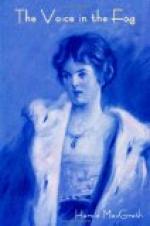“By special messenger, sir. It was thought you might be liking to have it at once, sir.” The page pocketed the shilling politely and departed.
“That’s the first bit of live work I’ve seen anybody do in this hotel,” commented Killigrew, striking a match.
“I have stopped here often,” said Crawford, “and they are familiar with my wishes. Excuse me till I see what this is.”
The quartet at the table began chatting again, about the fog, what they intended doing in Paris, sunshiny Paris. By and by Crawford came over quietly and laid something on the table before his wife’s plate.
It was the Nana Sahib’s ruby, so-called.
CHAPTER III
That same morning, at eleven precisely (when an insolent west wind sprang up and tore the fog into ribbons and scarves and finally blew it into smithereens, channelward) there stood before the windows of a famous haberdashery in the Strand a young man, twenty-four years of age, typically English, beardless, hair clipped neatly about his neck and temples, his skin fresh colored, his body carefully but thriftily clothed. Smooth-skinned he was about the eyes and nose and mouth, unmarked by dissipation; and he stood straight; and by the set of his shoulders (not particularly deep or wide) you would infer that when he looked at you he would look straight. Pity, isn’t it, that you never really can tell what a man is inside by drawing up your brief from what he is outside. There is always the heel of Achilles somewhere; trust the devil to find that.
Of course you wish to know forthwith who returned the ruby, and why. As our statesmen say, regarding any important measure for public welfare, the time is not yet ripe. Besides, the young man I am describing had never heard of the Nana Sahib’s ruby, unless vaguely in some Sepoy Mutiny tale.
His expression at this moment was rather mournful. He was regretting the thirty shillings the week he had for several years drawn regularly in this shop. Inside there he had introduced the Raglan shirt, the Duke of Westminster four-in-hand, and the Churchill batwing collar. He longed to enter and plead for reinstatement, but his new-found pride refused to budge his legs door-ward. Thirty shillings, twelve for his “third floor back,” and the rest for clothes and books and simple amusements. What a whirl he had been in, this past fortnight!
He pulled at his chin, shook his head and turned away. No, he simply could not do it. What! suffer himself to be laughed at behind his back? Impossible, a thousand times no! At the first news stand he bought two or three morning papers, and continued on to his lodgings. He must leave England at once, but the question was—How?
It was a comfortable room, as “third floor backs” go. He read the “want” advertisements carefully, and at length paused at a paragraph which seemed to suit his fancy perfectly. “Cabin stewards wanted—White Star Line—New York and Liverpool.” He cut out the clipping, folded it and stored it away. Then he proceeded to pack up his belongings, not a very laborious affair.




